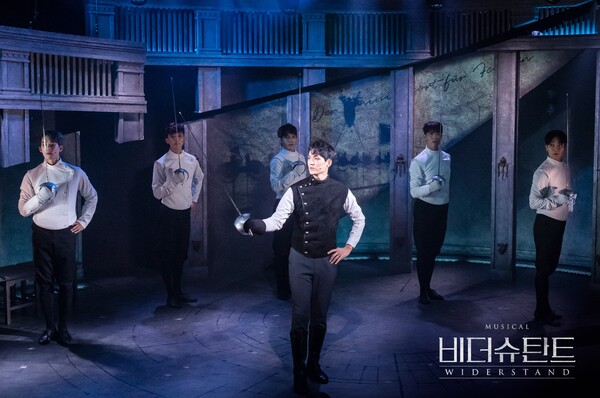
Fencing, Nazi Germany, and a whimsical soundtrack
It’s hard to imagine what could come out of the three keywords listed above, let alone see such a combination in South Korea. However, the musical Widerstand successfully combines these three elements and showcases them through a tear-jerking 110-minute masterpiece.
Set in 1938 Germany, known as “The Fateful Year” by Germans of the time, the audience is introduced to the main protagonist Magnus Volker, an ambitious 17-year-old fencer, and his friend Abel Luther. Having been star fencing players at their current school, Magnus and Abel are devastated to hear that the government will be abolishing all fencing programs, except one. The remaining program is at an elite sports academy known for training the nation’s best athletes. Though the two friends are confused by the sudden change in policy, they head to the sports academy in hopes of becoming the next national fencing representatives.
During the tryouts, the two friends meet Friedrich Kahl, a well-known fencing hero, and intimidating fencing instructor Reinhardt Klehr. Audiences are also introduced to two other fencing protégées, the arrogant Hagen Axmann and class joker Jasper Müller. Together, the five players are put through a series of tests including a physical test and an appearance evaluation. They are all selected to be a part of the fencing program.
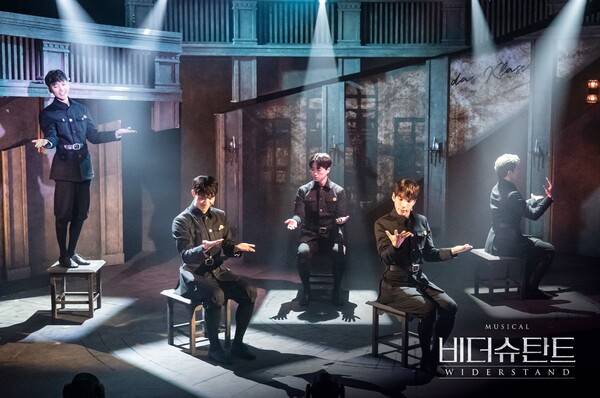
Classes under the strict teaching of Reinhardt are difficult. Students are ranked by skillset at the end of each class and those who rank in last place five times in a row are to be sent home immediately. In addition to their hardcore training, there are also strict rules that must be followed at the elite fencing school.
Students are constantly reminded of their ranks and are made to act accordingly. Students are forbidden to stand up against or speak up against the school’s beliefs. Punishment is natural. Last but not least, despite being part of a sports program, they are taught to use weapons, fight battles, and find themselves constantly learning Nazi Germany propaganda.
The conflict begins as Reinhardt speaks about violent forms of racial discrimination and radicalizes such actions by blaming the victims for being evil. Having repressed their disagreement for a while, Abel and Jasper end-up crossing the line by expressing contradictory feelings. The two are thrown into the school basement with no food to eat as a punishment.
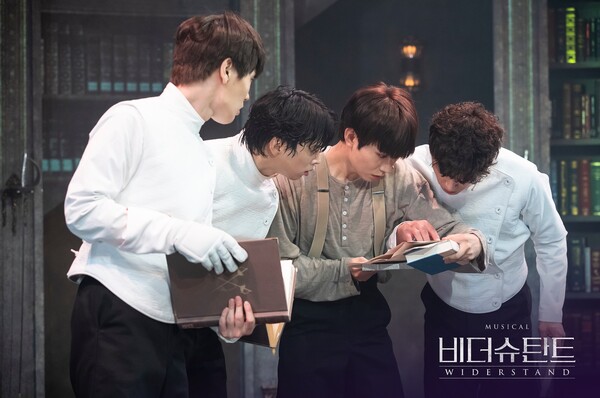
In the basement, the two friends find a document that fuels their growing doubt about the sports academy. However, they are unable to unravel the secrets contained as it is written in Morse code. When the two are finally released from the basement, they set out on a mission to find out the true nature of their academy. They form an organization called Widerstand and begin to unravel the hidden secrets of their academy.
Audiences cannot help but awe at the way the actors use the given small space. Changing quickly from one carefully calculated formation to another, the swift movements of the actors allow the audience to feel as if the stage is twice its actual size. The set design also plays a pivotal role in the musical. Built similarly to a grand hall with fancy pillars that also serve as a fencing sword holder, the set gives a Hogwarts-like ambiance, full of mystery and suspense.
Additionally, the change of location is made more distinct through the usage of different lights and projector screens. Various videos played in the background add greater understanding of the events happening on stage. The synergy between technology use and acting is most prominent in scenes where Magnus and Abel reminisce the good old days. Not only that, a secret room that reveals itself later in the musical is truly something that audiences should keep an eye out for.
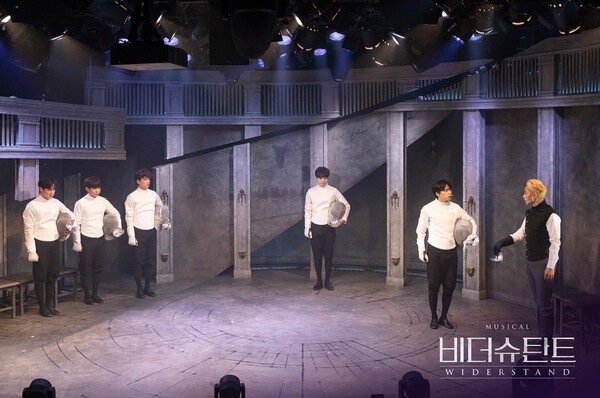
The realistic fencing actions shown by the actors draw the audience’s attention from the very beginning. One can feel the energy each actor brings to the table from not just the movements of their swords but also the stamping of their feet and shouts of either joy or despair after each action. The fencing style of each actor is similar to their character’s personality. Magnus with his heavy and rushed movements, and Jasper with his light-hearted and goofy movements differentiate each character as another point to focus on while watching the musical. One can tell the amount of effort each actor has put into perfecting their fencing skills.
The most surprising thing, however, is the fact that the actors are able to sing, act and fence simultaneously. While most people would struggle to fence for two hours straight, it is clear that the actors have also been closely managing their physical capability.
The choice of music is unexpected yet also the perfect fit. The whimsical soundtrack contrasts the darkness of the time the musical is set in. While some may have expected angry and aggressive music in scenes of war, the use of melancholy pieces plays with the emotions of the audience. There is a main melody that is constantly used but with different interpretations that creates a sense of nostalgia within the play.
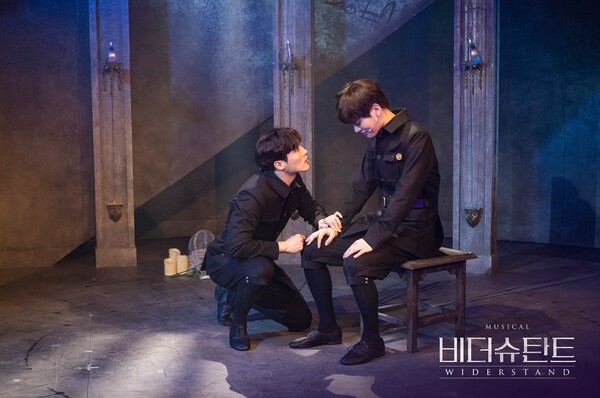
The constant change in relationship dynamics between the five fencing protégés reflects the conflicts that real-life athletes face in their careers. To support each other one day, only to be enemies the next, the world of sports seems to be much crueler than what is portrayed on the surface. In that sense, the musical perfectly illustrates the most common yet difficult balance humans attempt to find between rational thinking and emotion. This conflict is explored most transparently through Magnus who is constantly put into situations where he has to choose between his friends or his love of fencing. As the audience watches the character fall more and more into turmoil, it is only natural that they ask themselves the same question of where their loyalties would have stayed.
The musical is exceptional in its eye for detail. The constant costume changes, the use of fog, the specificity of lighting, everything adds to the overall ambiance of the musical. It is through these details that the combination of fencing, whimsical soundtrack and Nazi Germany make sense.
Widerstand — with its great acting, surprising twists, and great scores — gives audiences a truly unforgettable experience with its refreshing theme. It is highly recommended to sports fans who may or may not be into musicals or fans of musicals who are looking for something new.
Date: 2022.06.30 ~ 2022.09.25
Place: Dream Art Center
Running time: 110 minute

